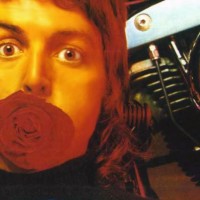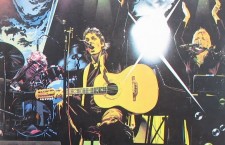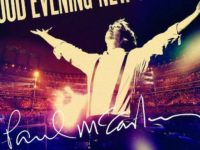Tonight’s “Paul McCartney: The Library of Congress Gershwin Prize for Popular Song in Performance at the White House” — premiering at 8 p.m., and then repeating all week on PBS stations — had us digging through the stacks, looking for favorites from throughout his career. (Click through the titles for complete reviews.)
GOOD EVENING NEW YORK CITY (2009): There are plenty of live favorites here, but McCartney mines deeper into a catalog stuffed with great music, too — underscoring his easy command of the substantial (a grinding take on “I’ve Got A Feeling,” from 1970’s “Let It Be”), the surprising (“Day Tripper,” Lennon’s flipside of the 1965 single “We Can Work It Out”) and, of course, the silly (“Mrs. Vandebilt,” with its fun “Ho! Hey Ho!” call-and-response chorus from the 1973 Wings smash “Band on the Run”). The recording is bolstered, too, by stronger material from more recent McCartney efforts — something, for instance, that “Paul Is Live” (one of his worst selling live sets) wasn’t blessed with. He absolutely charges through a pair of stomping rockers, “Only Mama Knows” from 2007’s “Memory Almost Full” and “Flaming Pie,” the Lennon-inspired title track of a 1997 McCartney release.
ELECTRIC ARGUMENTS (2008): The difference between this — by far the most successful of a now three-part series — and, say, 1980’s “McCartney II” is that Paul has someone to bounce ideas off of. There is another voice in the room, much like John Lennon, to push him, and to pull him back. Without that, these outsider moments tend to exist more as unfocused vanity projects (“Wild Life,” “II”), self-involved noodlings (the closing sequence on “Red Rose Speedway,” that instrumental on “Back to the Egg,” several interludes on “Tug of War” and “Pipes of Peace”) or simply half-finished demos (Paul’s debut solo recording, parts of “Flaming Pie”). There’s a frisky, yet more controlled spontaneity. ALSO: Here’s an indepth look at “Nothing Too Much Just Out of Sight.”
‘SEE YOUR SUNSHINE’ (2008): Background vocals, bright and cyclic, so strongly recall Denny Laine and late wife Linda as to transport you completely back into 1976. This is the kind of pure pop that McCartney — at this point embroiled in a very public and nasty divorce — parlayed into a soundtrack for the decade immediately following the Beatles’ own ugly split. And just as welcome. McCartney is supposed to sound like this song. That he meets that standard, so fully inhabits the cliche, during a period of crushing adversity is part of his charm. It always has been.
‘NO OTHER BABY’ (1999): Paul McCartney, still stung by the loss of his wife, was feeling nostalgic. But instead of rehashing the obvious successes he’d had with the Beatles or Wings, he traveled further back – all the way to the music that first sparked something inside the hearts of a young John Lennon and Paul McCartney: The records of the 1950s, of Chuck Berry and Larry Williams, of Carl Perkins and Gene Vincent. His clear anguish over Linda McCartney’s death gives added heft to the final refrain on this old Bobby Helms tune: “I don’t want no other baby but you!,” McCartney sings, with a menacing then melancholy emotion. “I don’t want no other baby,” he then sings, quieter still.
STRAWBERRIES OCEANS SHIPS FOREST (1994): Since the joys of Eno’s first ambient noodlings, many are the eggheads who’ve taken it upon themselves to fire up the synthesizer and get after it. None, it would seem, more surprising than one Sir Paul. Yet, a brush with his catalog clearly predicts the crisp, dancy stuff on “Strawberries …”: Specifically, there’s “McCartney II,” the 1980 release that marked the official breakup of Wings. There is the same fitful brilliance here, matched with swoons into rote techno-razzle with no dazzle. This could have to do with the editing process — or the lack there of. Only one tune is under eight minutes long — and it’s still more than seven and a half.
SOLO, BUT WITH THE OTHER BEATLES: Here is the rundown of our actual Beatles post-1970 reunion album. (Forget the posthumous stuff like “Free As A Bird.”). It features at least two Beatles on every track – and is put together like their real albums, alternating voices and styles. ALSO: More recently, Paul guested on Ringo Starr’s 2010 release “Y Not,” playing on a air of tracks including “Walk with You.”
THOUGHTS ON DENNY LAINE, WITH PAUL: Denny Laine — Fab, one time removed? — will forever be that other guy in Wings, the Paul McCartney-led 1970s successor band to the Beatles. Even if that belies Laine’s important earlier contributions to the Moody Blues (“Go Now,” a Wings concert staple), his occasional takeout mom
ent with Paul’s band (in particular on 1978’s “London Town”), a batch of interesting songs that never made those Wings projects, and his own (admittedly sporadic) solo efforts. That got me to thinking: What if Denny Laine had put out an album as the leader of Wings? Here’s my burn-ready remix of songs, each with Laine on lead vocals, from the band’s heyday.
McCARTNEY WITH THE BEATLES: Our thoughts on … 1966’s “Revolver,” which may just be the band’s best-ever release. … Curious asides from 1968’s self-titled release, widely known as “The White Album.” … The band’s late-period masterpiece “Abbey Road.” … The 2003 update of “Let It Be,” newly subtitled “Naked.” … The 2006 Beatles remix, “Love.” … And McCartney, as a solo artist, performing some Fab favorites live — mixed with similar bits of Beatle nostalgia from his former bandmates.
BEST BEATLES SONGS YOU’RE NOT SICK OF YET — “You Never Give Me Your Money”: One of the initial song-cycles-within-a-song concepts by McCartney. Too bad Paul was just getting started. By the time we get to Wings’ “Red Rose Speedway” a couple of short years later, McCartney has transformed a pretty good idea into nothing more than a handy way to tidy up his work station. But even those mashed-together edit jobs of half-finished song ideas can’t tarnish this terrific effort. When I only have time for a moment with Abbey Road, you’ll find me here, enveloped in a towering achievement that manages to fit in the personality, verve and specificity of each band member — even while deftly recognizing, by the final repeated chorus, both the hopeful optimism and crashing cynicism of the 1960s. I know, that’s a lot. It’s all in there. “You Never Give Me Your Money,” to me, is the last best thing this group ever did.
- How Deep Cuts on ‘Music From Big Pink’ Underscore the Band’s Triumph - July 31, 2023
- How ‘Islands’ Signaled the Sad End of the Band’s Five-Man Edition - March 15, 2022
- The Band’s ‘Christmas Must Be Tonight’ Remains an Unjustly Overlooked Holiday Classic - December 25, 2016





